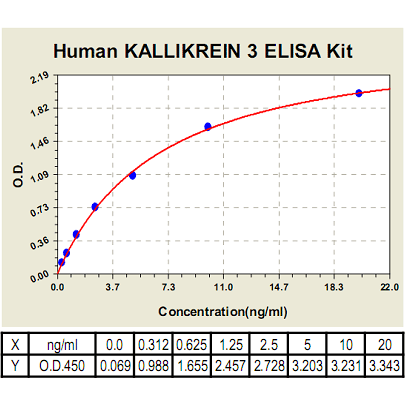Kallikrein 3/PSA ELISA Kit, Human |
 |
BACKGROUND Human tissue kallikrein-related serine peptidases (KLKs) constitute a single family of 15 highly conserved trypsin- or chymotrypsin-like serine proteases encoded by the largest contiguous cluster of protease-encoding genes (KLK1-15) in the human genome mapped to chromosomal locus 19q13.4. The most widely known member of the KLK family is KLK3 or PSA (prostate-specific antigen) that has applications in the diagnosis and monitoring of prostate cancer.1 Tissue KLKs are usually divided into two groups the “classical” and the “non-classical” KLKs. The term “classical” KLKs is referred to the first members of the human KLK family that were identified, namely KLK1, KLK2, and KLK3 (PSA), whereas the rest are often referred to as “non-classical”. All currently reported KLK genes encode for single-chain prepro-enzymes with lengths varying between 244 and 293 amino acid residues and approximately share 40% protein identity. The preproKLKs are proteolytically processed to enzymatically inactive proKLKs that are secreted via the removal of an amino-terminal signal peptide. Subsequently, proKLKs are activated to mature peptidases extracellularly by specific proteolytic cleavage of their amino-terminal propeptide, a key step in the regulation of KLK functions. Characteristic features of KLKs are the invariant residues of the active-site catalytic triad His57, Asp102 and Ser195, as well as a conserved Gly193 (human chymotrypsin numbering system) which is implicated in stabilizing the oxyanion intermediate of the internal peptide bond during hydrolysis. KLKs are expressed in a wide variety of tissues including the pancreas, heart, lung, central nervous system, salivary glands and endocrine-regulated tissues such as thyroid, breast, testis, ovary, prostate, indicating that they participate in important biological processes. Indeed, several lines of evidence support that KLKs cooperate in complex proteolytic cascade pathways to regulate physiological and pathological processes.2 For instance, KLK5, KLK7 and KLK14 are involved in skin desquamation and other skin diseases while KLK2, KLK3 and KLK5 have been involved in seminal plasma liquefaction. Of particular note, KLKs are implicated in different stages of cancer development and progression and have emerged as powerful tumor markers as demonstrated by the PSA testing.3
REFERENCES
1. Debela, M. et al: Biol. Chem. 389:623-32, 2008
2. Sotiropoulou, G. et al: J. Biol. Chem. 284:32989-94, 2009
3. Borgoño, C.A. & Diamandis, E.P.: Nat. Rev. Cancer. 4:876-90, 2004
2. Sotiropoulou, G. et al: J. Biol. Chem. 284:32989-94, 2009
3. Borgoño, C.A. & Diamandis, E.P.: Nat. Rev. Cancer. 4:876-90, 2004
Products are for research use only. They are not intended for human, animal, or diagnostic applications.
Параметры
Cat.No.: | CL0816 |
Target Protein Species: | Human |
Range: | 31.2pg/ml-2000pg/ml |
Specificity: | No detectable cross-reactivity with any other cytokine. |
Storage: | Store at 4°C. Use within 6 months. |
ELISA Kits are based on standard sandwich enzyme-linked immunosorbent assay technology. Freshly prepared standards, samples, and solutions are recommended for best results.
Документы
Информация представлена исключительно в ознакомительных целях и ни при каких условиях не является публичной офертой








